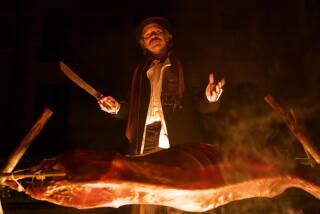‘Contagion’ director Steven Soderbergh on Hollywood reopening: ‘We’re going to get back to work’
- Share via
When the before times turned into the quaran-times, many people turned to the movie “Contagion” looking for something like answers. The 2011 movie, directed by Steven Soderbergh and written by Scott Z. Burns, was part procedural drama, part horror thriller as it methodically told the tale of a global pandemic, one that started in Asia, spread undetected around the world and then struck with deadly, lightning-fast results. In 2020, it plays like some sort of quasi-documentary, disturbingly prescient to the current moment.
In April, Soderbergh was announced as head of a committee assembled by the Directors Guild of America to look into how Hollywood can eventually get back to work after the widespread shutdowns caused by the COVID-19 pandemic.
On Tuesday, a day before Gov. Gavin Newsom’s event touting a return to filming, Soderbergh answered a few questions about the work of the DGA committee as well as the unexpected prognostication of “Contagion.” Soderbergh was taking part in a conversation with Andrew Patterson, director of the film “The Vast of Night,” currently playing sneak-preview screenings at drive-ins and premiering on Amazon Prime on May 29.
The good news is there’s absolutely going to be a way to go back to work and to keep people safe.
— Steven Soderbergh on getting Hollywood working again
“The good news is there’s absolutely going to be a way to go back to work and to keep people safe,” said Soderbergh. “I think what’s happening at the moment is a series of very detailed conversations amongst the guilds and the producers about how to really refine the approach. But I feel very confident in how this is going, that this will be solved and that we will be able to get people back to work safely.
“I think the question everybody’s asking is whatever the series of guidelines or protocols is, how quickly can it scale? And that’s still an open question because of the resource issues that everybody is having in the country,” Soderbergh added. “I think the coming up with a plan to keep people safe actually turns out to be not that difficult. When you talk to an epidemiologist, it’s pretty clear what you have to do.
“The question becomes, can we get back to the period just before COVID took everything over — 250 TV shows, 50 movies, 50 variety-reality specials, that’s a lot of activity,” he said. “How long before we can get it back to that level is really a question that we’re all trying to figure out right now. But I’ve seen the shape of this and we’re going to get back to work.”
Soderbergh is likely eager to return to work himself. In another interview on Tuesday, ostensibly promoting his Bolivian liqueur Singani 63, Soderbergh revealed that while in quarantine he has written three film scripts — a rewrite of an existing script, an adaptation of David Levien’s “City of the Sun” and a sequel to his 1989 breakthrough, “Sex, Lies and Videotape.”
Soderbergh was more circumspect when asked by The Times about the foresight of making “Contagion,” and his newfound status as a leading cinematic expert on pandemics.
“Everybody we talked to when we were preparing that film, every expert, when we asked them how will the next one start, to a person, they said, wet market, Asia, there’s probably going to be a bat involved. Literally all of them. Ten years ago, 11 years ago. So it’s not a surprise.
“It’s been fascinating to see the aspects of this narrative play out that we didn’t think about,” Soderbergh said. “The sociological behavior, how people have behaved as individuals, as states, as countries — that’s been really fascinating. And something that very purposely, Scott and I were trying to keep the narrative very focused and we had rules about points of view and what we can see and what we couldn’t see.
“But wow, there’s a lot of really fascinating human behavior that we didn’t even think about when we were doing this. It’s just a reminder of how deeply irrational we are. When we’re put into some sort of fear-threat space, we become deeply illogical. It’s crazy to witness.”
More to Read
Only good movies
Get the Indie Focus newsletter, Mark Olsen's weekly guide to the world of cinema.
You may occasionally receive promotional content from the Los Angeles Times.









